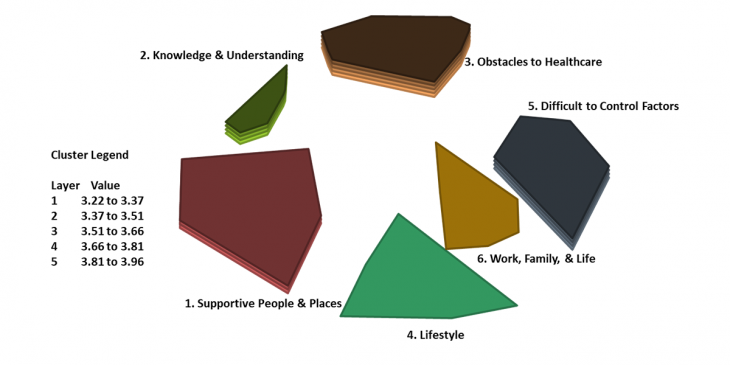Cardiovascular disease is a major reason life expectancy is more than two years lower for Appalachian women than their peers in the rest of the U.S. A recent study from the University of Pittsburgh Graduate School of Public Health provides new understanding of factors affecting the heart health of this population.
The new insights reflected many previously identified challenges while highlighting new areas of focus for future interventions in Appalachia, a rural and low socioeconomic region of 420 counties across 13 states encompassing the Appalachian Mountains and including much of Pennsylvania. The results are presented today at the American Public Health Association 2021 Annual Meeting in Denver.

Dr. Jessica Thompson
Appalachian women tend to have uncontrolled cardiovascular disease risk and yet remain an understudied population. Dr. Jessica Thompson, who recently completed her Ph.D. at Pitt Public Health and is now a postdoctoral scholar at the University of Kentucky Markey Cancer Center, clarifies, “There is just so little work that we do in the Appalachian region and the work that is done is largely in the cancer sphere. In terms of cardiovascular disease, we just don’t know much.”
Recruiting study participants from an understudied community during a pandemic posed challenges, but Thompson overcame them by using a powerful method for collecting individual and group data that combines quantitative and qualitative elements called “concept mapping.” This allowed participants to conduct most of their activities directly and easily online.
“Concept mapping has several strengths, including the involvement of participants in a series of steps that result in a wealth of data,” said Dr. Jessica Burke, an adviser for the study and professor of behavioral and community health sciences at Pitt Public Health. “The concept maps illustrate the associative complexities by visually displaying the range of ideas and the relationship between those ideas. Concept maps can be easily interpreted by community members, other researchers and policy makers.”
The concept mapping revealed what Appalachian women perceived as factors related to cardiovascular disease prevention. Their answers included limiting behaviors typically associated with cardiovascular disease risk and tackling access challenges inherent to Appalachian communities. Thompson found one of the most interesting clusters of heart health factors was something participants referred to as “difficult to control.” This cluster consisted of elements such as poverty level of the community, underlying genetics and comorbid conditions.

This concept map shows how Appalachian women ranked the importance of certain concepts in relation to whether they received preventive health screenings, such as for cholesterol, blood sugar and blood pressure. The thicker the layers, such as “Obstacles to Healthcare,” the greater the importance.
Participants also identified interventions for prevention, including nontraditional sources for health information, holistic and consistent healthcare, and positive messaging.
“They were asking for messaging specific for women. They were requesting that this information come from non-physician places ranging from their church to a pharmacist to their neighbor down the street. And part of what they were really looking for was positive validating messaging. So, ‘I want you to not just see the way that I look or whatever you’re measuring, I want you to see me as a whole person,’” said Thompson.
Thompson’s work has been generating positive eagerness in the communities with which she engages.
“In Appalachian Pennsylvania, I don’t think there is a lot of research going on in general,” she said. “Most of the women I talked to were just really excited that anyone wanted to ask them anything at all.”
These women were not alone in their excitement as Thompson was recently selected for the Doctoral Award for the Community Health Planning and Policy Development section at the annual American Public Health Association meeting. Her research among Appalachian women has been recognized for the ways in which it provides a framework for future action-oriented and community-specific strategies to improve cardiovascular disease prevention.
Dana Smith is a Ph.D. candidate in the Department of Psychiatry at the University of Pittsburgh School of Medicine. She is participating in the UPMC Science Writing Mentorship Program.








